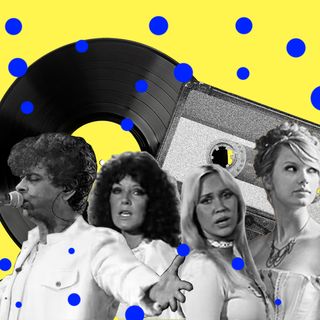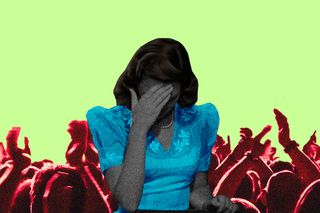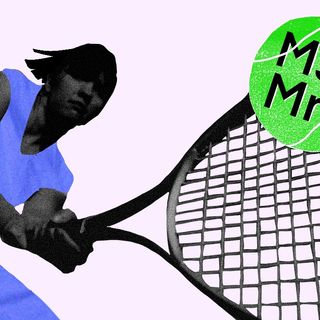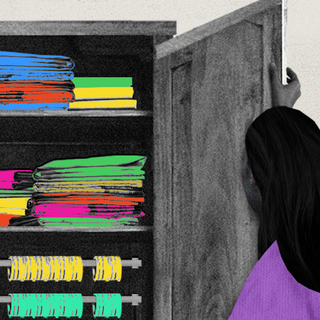
Is This Normal? “I Hate Concerts”
Heightened sensitivity to stimuli can make concerts and live music unenjoyable and even painful for many.

In this series, we dig into our strange phobias, fixations, and neuroses, and ask ourselves — Is This Normal?
By some inexplicable law of the universe, almost everyone I know is almost always yearning to go to a concert. I never understood the attraction these events held for my peers, though. So, I was curious. However, each time I attempted to investigate the brouhaha around concerts by attending them myself, I ended up feeling queasy, awkward, and out of place, at best; at worst, I experienced anxiety attacks or meltdowns. Soon, I chose to preserve my sanity over both my investigative urges and my desire to fit in with my cooler peers.
Why do some people absolutely love the experience of concerts and music festivals, though, while others — like me — detest them with a vengeance? Every time I see people posting stories about how muchfun they had at music festivals, I can’t help but wonder if my reaction to these events is normal. Turns out, it is.
For starters, it may have something to do with people’s sensitivity to stimuli. In 2017, a Buzzfeed article described concerts as “crushed-together, smelly, standing-only, loud, hot, gritty, jostly gigs.” The following year, echoing my sentiments, a Reddit post noted, “I really don’t like concerts… I’m just not into standing in a gross crowded stadium for two hours… Also, at the concerts that I’ve been to, the crowd is encouraged to sing along, [but] I lowkey just wanna sit quietly and watch a performer, I don’t have a desire to interrupt them by cheering and singing along.”
The loud noise and glowing lights — besides the throngs of fans who are soon reduced to a sweaty crowd — can be overwhelming for many neurodivergent people. Perhaps, it is my autism that makes concerts unbearable for my nervous system. Increased sensitivity to noises is associated with being a highly sensitive person, or HSP, too, which almost 20% of the global population is believed to be.
Related on The Swaddle:
Is This Normal? “I Hate Parties”
Basically, heightened sensitivity to stimuli makes concerts not just unenjoyable, but even painful for many. It’s almost as if some bodies simply weren’t designed to withstand something as overwhelming as concerts — even if they per se enjoy the music that’s being played. “Autism brings me a lot of fatigue, and not having spaces to sit down is really difficult. It would be nice to not have to ask for a chair, and some venues don’t even have chairs, which is ridiculous… Most of the time, I wear ear defenders, stand near the back and take very, very frequent breaks,” Elliot Knight, a Bristol-based punk musician who is also autistic, told The Guardian about their experience attending musical gigs.
For others, though, live music itself is the problem; there’s something about the way the ambiance in front of our eyes doesn’t align with the auditory experience music entails. “In shows, I find the singer and the instruments to clash. The instruments are either too loud, watering the voice down, or the instruments are too low and don’t feel fully present. For recorded music, I find everything to sound just right. In great songs, the instruments and the voice mesh perfectly in a way I’ve rarely come across with live music,” Noah Kest wrote in an article on 34th Street.
Besides the technical differences between the live and the recorded versions of songs, concerts also make it difficult for some people to truly immerse themselves in the music they love. Indeed, the concerts are not just an assault on the physical senses of many, but also on their “sacred sense of privacy” — something that may be instrumental (pun intended) to their ability to enjoy music.
“I’d rather just lie in bed, walk on the street, or sit in a park and listen to music in my own setting. I can control the volume, have authority over song choice, and play what I choose. I find it a better zone to meditate on the lyrics, become aware of the instruments, and just introspect…” Kest adds. “I feel a little awkward standing [at a concert] listening to someone perform. I just don’t really know what to do with myself. I don’t like singing along surrounded by a bunch of strangers.”
Related on The Swaddle:
Is This Normal? “I Feel Like Someone Is Always Watching Me, Even When I’m Alone”
Agoraphobia — an extreme fear of crowded outdoor venues — can also contribute to people’s dislike of concerts.
“Concerts are like… [e]verything I don’t like wrapped up into one,” one Reddit user wrote four years ago — validating my experience, in the process. Evidently, I’m not the only one who hates concerts.
Nor am I the only one who, so far, felt out of place for their dislike of concerts. “Of course, I’m free not to go to live shows. But people such as me — and again, I’m most certainly not alone — are made to feel somewhat odd, or at odds with the wider world, for that stance,” Konrad Marshall wrote in The Sydney Morning Herald.
Science, and validation from strangers on the internet, gave me the push to start doing what I should’ve been doing already: accepting that my nervous system isn’t cut out for concerts, and staying the hell away from them. So, the next time someone proposes we attend a concert together, I can just let them know politely that I belong to the “no-concert club,” rather than coming up with excuses about how I’m busy that day.
Devrupa Rakshit is an Associate Editor at The Swaddle. She is a lawyer by education, a poet by accident, a painter by shaukh, and autistic by birth. You can find her on Instagram @devruparakshit.
Related


Wimbledon To Drop ‘Miss,’ ‘Mrs.’ From Women’s Honor Board
